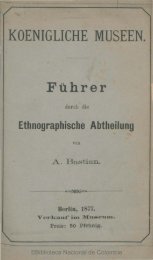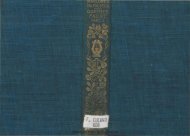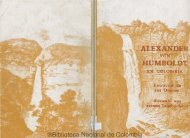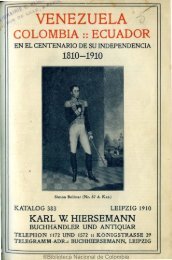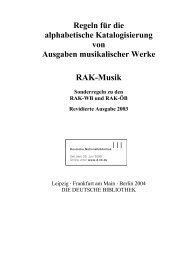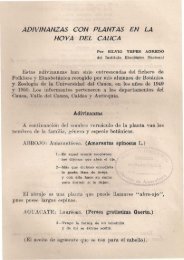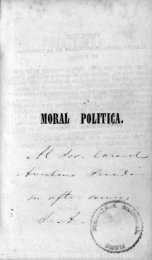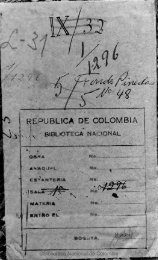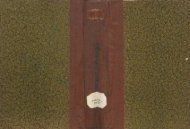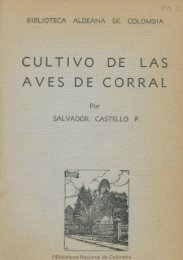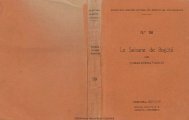You also want an ePaper? Increase the reach of your titles
YUMPU automatically turns print PDFs into web optimized ePapers that Google loves.
<strong>©Biblioteca</strong> <strong>Nacional</strong> <strong>de</strong> <strong>Colombia</strong><br />
BOOK I. 305<br />
459. Jam, i. e. by this time. O.<br />
461. Sunt- Iaudi, lW'e, too, lia. "'Q)·th its Oto.1 (: ••. its fitting)<br />
reward8. "Laudi" being in i<strong>de</strong>a the suhject of the proposition, Bua<br />
refers to it. - Laudi. H. 387; A. & S. 22G; B. 821; A. 51, VI.<br />
462. Rerum, 10" "';810rt,me8. Ohjective gen. A. & S. 211, Rem. 12.<br />
It Res" is applied to the oirculllstances and vicissitu<strong>de</strong>s of life, whether<br />
good or bad.<br />
465. Multo.. 11.371, I, 3), (2); A. &; S. 205, Rem. 10; B. 717; A. 52, IV.<br />
466-493. Of tbe eight piotures on the temple w,tlls each two were<br />
companion-pieces, viz.: 1. 'rhe victory of the Trojans un<strong>de</strong>r Heotor;<br />
2. The victory of the Greeks un<strong>de</strong>r Achillcs. 3. The <strong>de</strong>ath of Rhesus;<br />
4. 'rhe <strong>de</strong>ath of Trollus. 5. Tbe Trojan matrons suppliants before<br />
tbe statue of Minerva; 6. Priam as a suppliant before Aebilles. 7. The<br />
hattIe of Memnon; 8. The battle of Achilles. Wby were these subjects<br />
chosen for paintings to adorn the temple of J",IO' See line 24.<br />
466. Uti, halO. An interrogative particle, and hence introducing tbe<br />
subj. in <strong>de</strong>pen<strong>de</strong>nt clauses.<br />
467,468. Hac, sc. pa,·te. - Phryges, so. luge,·ent. - Fugerent, 1OOl'e<br />
fleeing, while Aeneas was looking at them. So with the other impel"<br />
fects. By making the action expressed in these verbs contemporaneou8<br />
with that in vi<strong>de</strong>bat, thc poet indicates the life·Ukeness with which the<br />
paintings brought the scenes before the eyes of his horo.<br />
469. Rhesus was a Thracian prince, an ally of tbe Trojans. "An<br />
oracle had <strong>de</strong>clared that Troy would never be taken, if the snow-white<br />
horses of Rhesus should once drink the wator of the Xanthus, and<br />
feed upon the grass of the Trojan plain. But as soon as Rhesus had<br />
rea.ched tho Trojan territory, and had pitched his tents late at night,<br />
Ulysses and Diome<strong>de</strong>s penetrnted into his camp, slew Rhesus himself,<br />
and carried off his borses." - Niveis tentoria velis. Homer represent.<br />
the Greeks and Trojans as cncamped, not in tentB, hut in hut. of planks<br />
thatcbed with grass; hut Virgil here, as often, ascribes to tbe Homeric<br />
age the customs of his own. To him, as to us, a "tented field" presents<br />
a more attrnctive picture than a hutted lleld.<br />
472. Ar<strong>de</strong>ntes equos, thefienj .teed •. -Avertit. Historical present,<br />
hence followed by the pluperf. in tho next line, (the 1Iwallillg governIng<br />
instead of the form.)<br />
473. Gustassent = gustavissent. - Xanthus (otherwise called Scaroan<strong>de</strong>r),<br />
a river of the Troad.<br />
474. Tronus, 0. SOn of Priam. - Amissis armis, i. e. all but his<br />
apear (line 4.78).<br />
476 Trollus has fallon backwards from the car (which of course had<br />
20 Vir.



